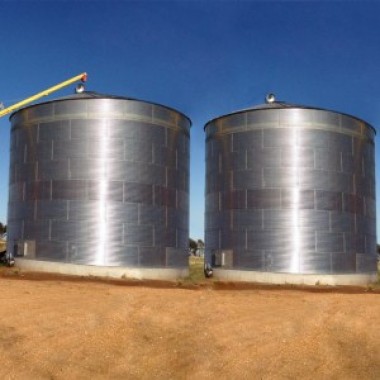With the help of local grain millers, Rolex Laureate Felix Brooks-Church is working to end malnutrition in East Africa
Felix Brooks-Church at a maize mill in Tanzania, where he works with the community to add essential nutrients to food. Africa Flour Mill

Despite advances in farming technology and the tireless work of aid organizations, the number of people facing hunger and malnutrition around the world is on the rise.
According to the World Food Program, 345 million people experienced food insecurity in 2022, an increase from 282 million the previous year. Malnutrition affects one in three people on Earth, including more than 150-million children.
Felix Brooks-Church hopes to reduce that number significantly. His non-profit, Sanku, works with small-scale grain millers to make better nutrition available to more than two-million people in East Africa and plans to reach 100 million more by 2030.
“I think international development and giving back has always been a part of me,” says Brooks-Church, whose family lived in North Africa, South America and Europe before settling in the United States.
After earning a degree in geology, Brooks-Church moved to Cambodia to work for a non-profit dedicated to helping street children. His years there helped him learn two important things: he wanted to dedicate his career to non-profit work, and that a wide range of problems in the developing world could be solved by improving early childhood nutrition.
“It introduced me to the concept that better nutrition equates to better health outcomes, and potentially a better life,” he says. “Getting to children in those first 1,000 days of life is the foundation for all other development.”
Sanku’s strategy to achieve this is both simple and high-tech.
Brooks-Church’s non-profit developed a machine called a “dosifier,” which attaches to any free-flowing grain mill and blends a precise amount of nutrients into the milled grain. ©Rolex/Marc Latzel
In Tanzania, where the non-profit is based, a large portion of the population subsists on maize flour, which does not provide sufficient nutrients on its own. Working directly with hundreds of local maize millers, Sanku provides a vitamin-rich fortification powder that, when mixed into the flour during the milling process, enriches it with essential nutrients.
To do this, Sanku developed a machine called a “dosifier,” which attaches to any free-flowing grain mill and blends a precise amount of nutrients into the milled grain. By providing each miller with a dosifier, and connecting the machines via local wireless networks, Sanku can precisely track each mill’s output, and provide the millers with the exact amount of nutrients they need.
The millers get both the machine and the nutrients free of charge, with Sanku subsidizing the cost by selling grain bags to the mills at market price.
“Using economies of scale, we can buy the grain bags (wholesale), sell them to the millers, and the savings are enough to cover the cost of fortification,” Brooks-Church explains. “And most importantly, there’s no additional cost for the end consumer. Now a mother can walk up to a small shop or a mill in a village and buy fortified flour at the same cost as unfortified flour.”
Sanku’s mission in East Africa received a major boost in 2021, when Brooks-Church received a Rolex Award for Enterprise. Founded more than four decades ago, the Rolex Awards for Enterprise are given annually to individuals who are finding new and innovative ways to advance human knowledge and well-being around the world.
Receiving the Rolex Award for Enterprise has enabled Brooks-Church’s non-profit to expand to work with over 1,000 mills and hire more staff. ©Rolex/Reto Albertalli
“That funding helped with expansion not just in Tanzania, but also across the border in Kenya,” Brooks-Church says. “It also helped us to hire more staff who will allow us to scale into a larger company.”
Starting with just 50 dosifiers in 2015, Sanku is now working with almost 1,000 mills throughout Tanzania and Kenya and it has introduced dosifier technology in Rwanda, Malawi, and Mozambique.
The more mills Sanku works with, and the more flour bags it sells, the more sustainable its business model becomes, Brooks-Church says. “The more people we reach, our cost per person comes down.”
Currently, for around 80 cents (U.S.) per person, Sanku can guarantee an entire year’s supply of fortified flour – a cost Sanku aims to reduce by more than half within a few years.
While Brooks-Church is already seeing anecdotal evidence that Sanku’s fortification project is working, it will be decades before the effects of better nutrition can truly be measured. He also points out that Sanku represents just one part of a collective effort to improve the lives of hundreds of millions of people in East Africa and around the world.
“Other people are working on policy, on education, on infrastructure in healthcare,” he says. “It’s exciting to be part of this ecosystem that will hopefully change and improve the health of an entire generation.”
Despite advances in farming technology and the tireless work of aid organizations, hunger and malnutrition around the world is on the rise.
The Perpetual Planet Initiative tells in-depth stories about global innovators and adaptors who are finding solutions to environmental challenges.

1000 T Assembled Silo Advertising feature produced by Globe Content Studio with Rolex. The Globe’s editorial department was not involved.